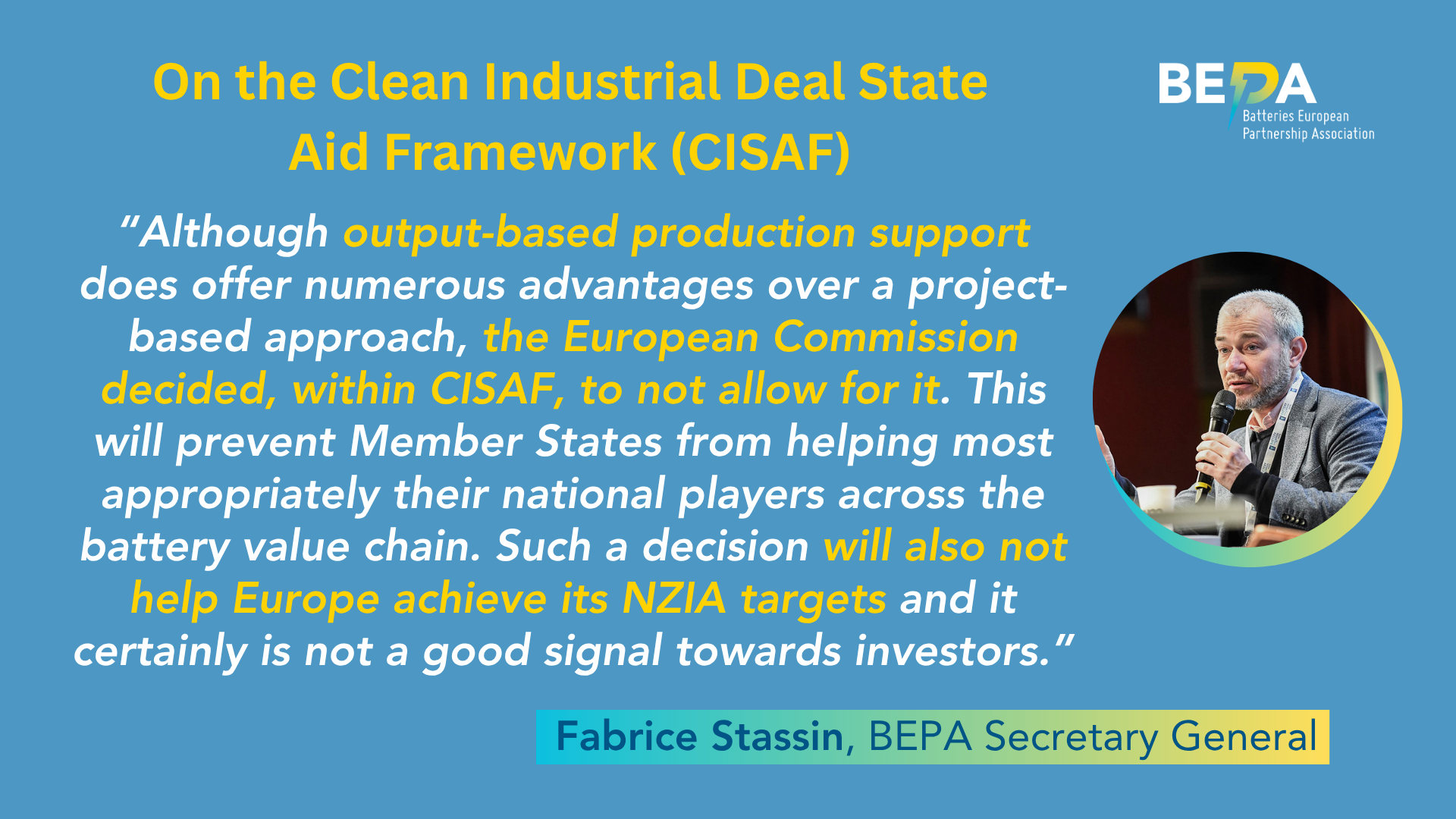
ICBR 2025 is celebrating its 30th anniversary this year, and its focus on battery recycling since its beginnings makes it more relevant than ever today.
In particular, the program in Valencia this year will focus on lithium-ion battery recycling, and the increasing number of participants, speakers, and exhibitors demonstrates the importance of communication and knowledge exchange on this issue.
Top industry leaders from the entire life cycle of battery recycling, from mining through use and collection at end of life to repair, reuse and recycling come together at ICBR, with experts and regulators to ensure this industry remains a vital and vibrant part of the circular economy in Europe and worldwide.
The event featured a roundtable discussion focusing on the battery circular economy in Spain, a fully booked exhibition hall, and two very different site visits: one to a Veolia waste management plant and another to the Nanophotonic Technology Center in Valencia.
More information and registration HERE
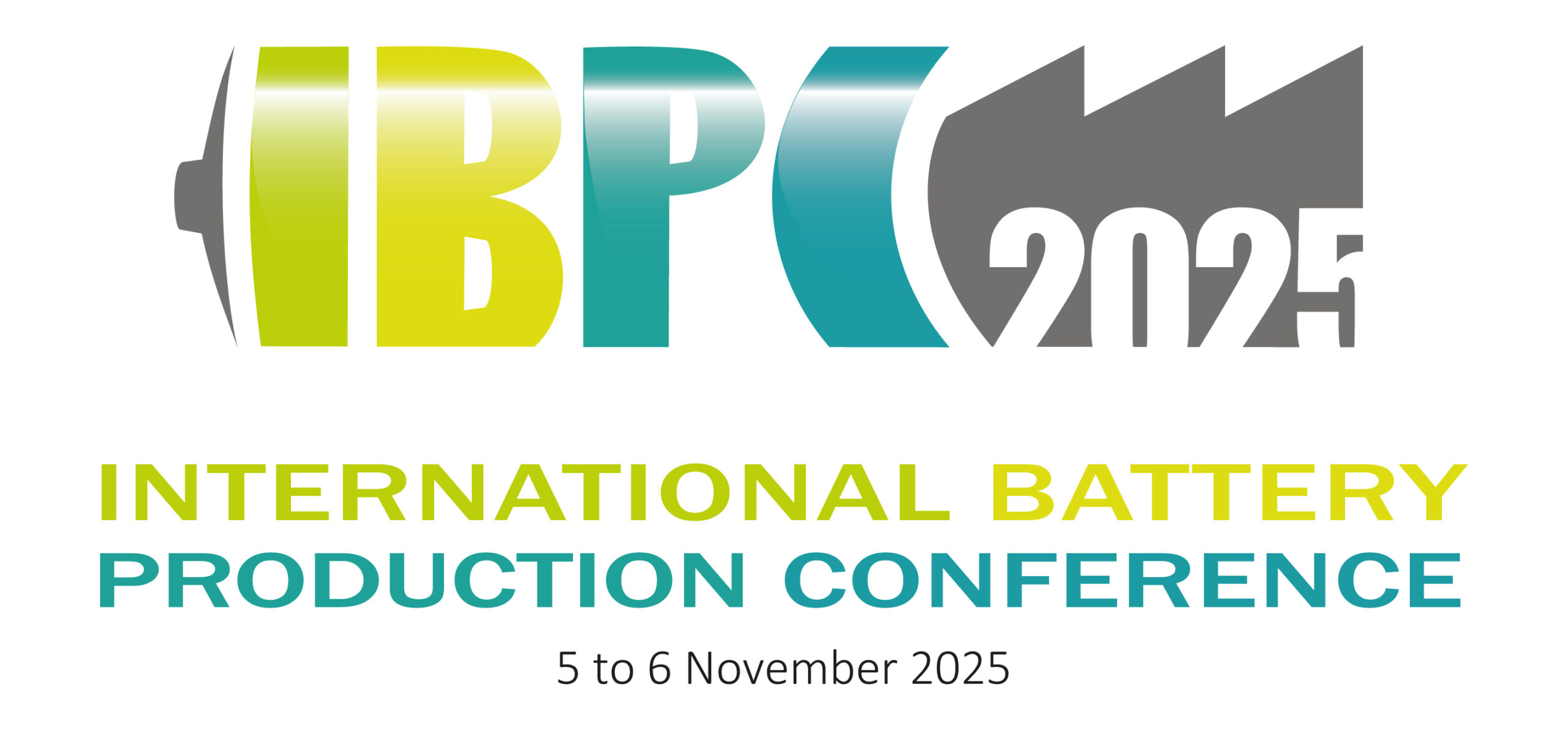
Attracting over 250 participants from research, industry, and policy, this year’s conference program will include:
• Over 50 technical presentations and 6+ keynotes
• A sponsor exhibition and poster session
• Equal academic and industrial participation
The conference also organises a Call for Abstracts, open until June 27, 2025. Contributions are welcome in the following areas:
- Electrode and Cell Production
- Analytics and Applications
- Development and Production of Innovative and Next-Generation Batteries
- Recycling & Sustainability

Join the leading event, where European automotive research leaders, industry, European Union and government representatives unite to discuss & shape the industry’s future.
This year’s program:
Tuesday, 30 September 2025:
EARPA General Assembly, Foresight Group & Collaborative Research Group sessions & Networking Reception & Exhibition.
Wednesday, 1 October 2025:
FORM Forum Conference Sessions & Explore the Exhibition
This year’s theme will focus on: Transitioning Road Mobility: Actions to Safeguard Europe’s Competitive Edge. The FORM Forum brings together stakeholders from industry, academia and governments to share of knowledge and ideas, providing the next generation with a new era of automotive solutions whilst serving as a powerful motivator for the continued growth of the automotive industry and its contributors.
The event is open to the whole EARPA community including industry, research, government, and representatives from the European Commission.
Information and registration HERE

The Energy Storage Global Conference (ESGC) offers a unique opportunity for industry, researchers and policymakers to exchange views on key issues faced by the energy storage sector. During three days, representatives will meet in Brussels and online for the 8th edition, at Hotel Le Plaza, on 14 – 16 October 2025, to discuss regulatory and policy frameworks, the future storage market, and the fast-growing sector of the Benelux region.
- The latest insights on energy storage policies, markets and technologies and applications.
- Networking opportunities throughout the conference and exclusive events.
- A dynamic exhibition space with 15+ sponsors and exhibitors, offering a chance to explore products, discover innovations, and connect with potential clients and partners.
- Engagement with a global audience of over 400 delegates, including industry leaders, researchers, and policymakers.
More information and registration HERE
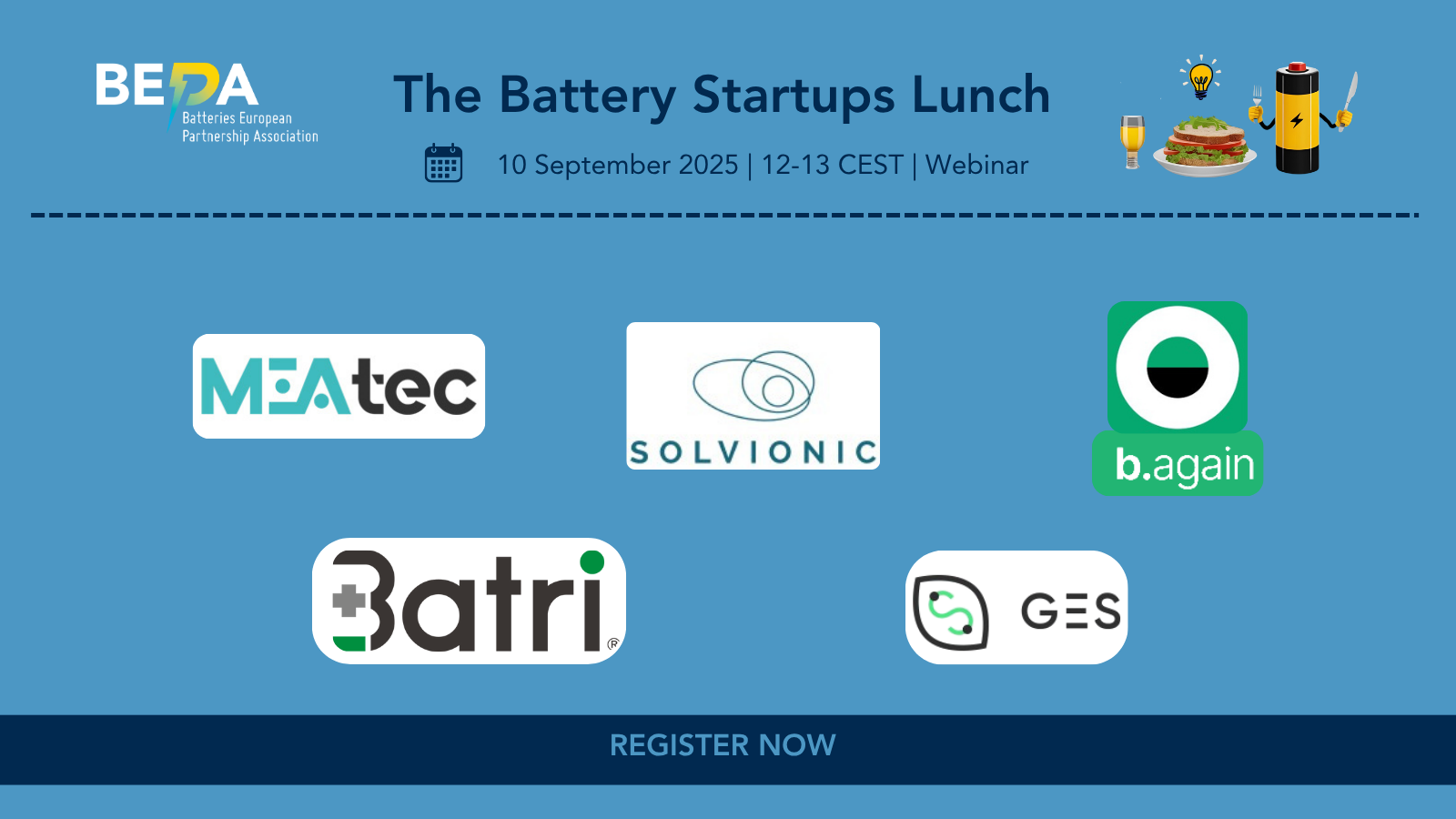
On 10 September 12:00-13:00 CEST, join us for the third Battery Startups Lunch. This edition will see presentations from the following startups: Solvionic, GES, Batri, b.again and mea-tec.
Learn about their product(s), their needs, and explore new potential collaborations with key stakeholders evolving in the battery sector.
Whether you are a corporate shark looking for the next innovation to boost your products, an investor hungry for your next big opportunity, or a researcher curious about new developing technologies, join our Battery Startup Lunch to discover, exchange, and build.
Want to be informed of future editions? Send an email to Timothé Perruchoud t.perruchoud@bepassociation.eu to be added on the invitees list.
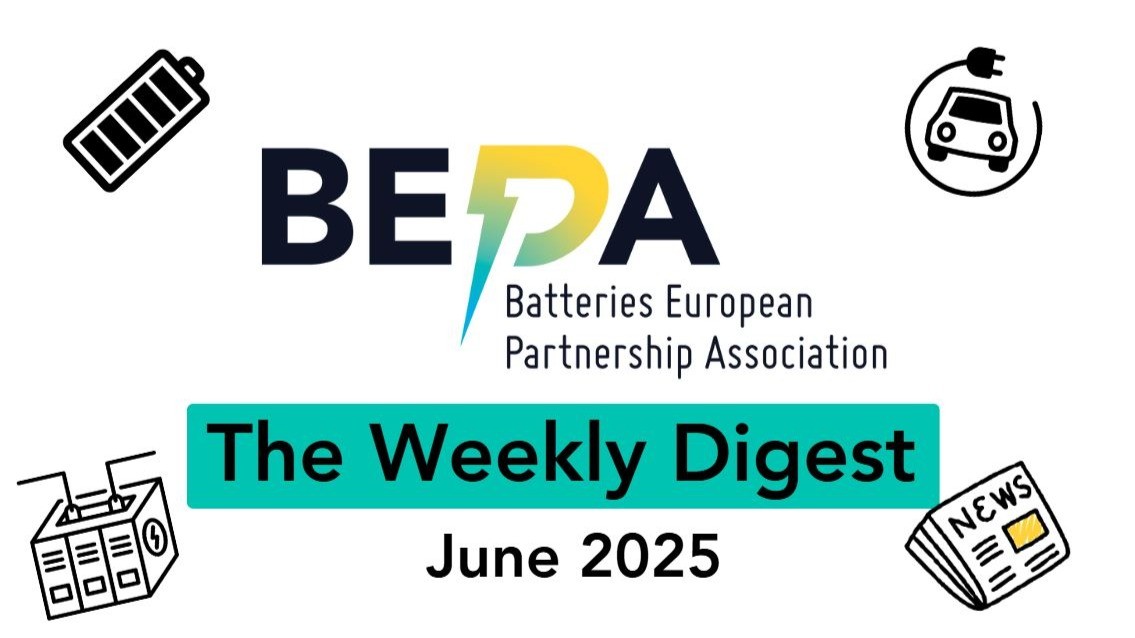
6 June
Starting up
- BEPA Reacts to EU’s release of its Startup & Scaleup strategy
- EU Start-Up Strategy Gets Warm Welcome, But Now Founders Want Action
Charts of the day
- Upcoming Commercial Readiness of All Solid-State Batteries
- Sodium-ion Batteries: Key Industrial Players
EU Battery Regulation
- Technical Support To Define Performance And Durability Minimum Requirements For Industrial Batteries
Insights and studies
- CAM Factories That Survive Chemistry Shifts
- Mini- and Microenvironments in Battery Cell Production: Players, Patents and Potential
- The Battery Bet That Changed the World
- Aging matrix visualizes complexity of battery aging across hundreds of cycling protocols
New developments
- Pioneer Project: Innovation and sustainability power Leonardo da Vinci Airport
- Stora Enso and Altris AB Partnership Development
- BASF starts commercial operation of Black Mass plant for Battery Recycling in Schwarzheide, Germany
- CATL Investigates Electrolyte Consumption in Lithium Metal Batteries
- Korean battery makers on high alert as US moves to spike EV subsidies
Events
- BEPA Webinar: Battery Stationary Energy Storage – Enabling Europe’s Energy Transition
- BEPA Webinar: The Battery Startups Lunch
13 June
Insights & studies
- Plan for the emergence, competitiveness, and resilience of an EU battery ecosystem — Leveraging combined use of local content policies and of new public aids schemes by Marine Hautsch & Jean-philippe Hermine
- What’s driving China’s sodium-ion battery sector to global forefront?
- AI-First: Bridging The Profitability Chasm In Battery R&D
- Sodium-ion batteries for two-wheelers
- Why smart infrastructure and energy intelligence hold the key to zero-emission by Kurt Vandeputte
- A comparative analysis of public R&I funding in the EU, US, and China
New development
- LiCORNE EU Project : Market Analysis, Community Engagement And Development Discussions
- POSCO Future M to lead entry-level and standard EV markets with LMR cathode materials
- AESC kicks off battery production at Douai gigafactory
- AQUABATTERY wins EUSEW Innovation Award
21 June
Insights & studies
- How do you successfuly commercialise your battery technology in Europe? by Elena Bonvecchio
- The Road to a Circular Economy: The Future of Battery Recycling
- Fast-Charging Batteries in Wearables: Tiny Devices, Big Innovations
- The government is sharing blame between Red Eléctrica and the companies for the massive blackout ( in Spanish)
New developments
- Saft and Safran to co-develop a high-voltage battery system for aviation
- Comau teams with Intecells to develop a new paradigm in battery electrode manufacturing Gian Carlo Tronzano
- CATL Starts Mass Production of LFP Cell for Stationary Energy Storage
Media
- Battery Startups Lunch with BASQUEVOLT , SOLiTHOR , Reliability and Safety Technical Center (RSTER) , Heimdalytics GmbH , Echion Technologies
- Europe’s Black Mass Bottleneck with Ilka von Dalwigk by Volta Foundation
- Direct Recycling a Shorter Path to New Batteries with Argonne National Laboratory Jeffrey Spangenberger by Volta Foundation
Events
- Battery Innovation Days: Registrations are open now!
28 June
EU Clean Tech Support
- The European Commission has adopted a new State aid framework (CISAF)
- EU rules out production aid in blow to battery and cleantech industry
- Scale or Fail: A Trade Strategy for Europe’s Clean Industry
- EIB Group increases 2025 financing ceiling to step up investments in security and defence, energy grids
- Unlocking the potential of dual-use research and innovation
New developments
- Redwood Energy: Fast, low-cost storage to power the age of AI and a changing grid
- QuantumScape Separator Process Enters Baseline Production
- CellLab Project to Advance Digitalized Battery Production
- Northvolt gets indicative bid
- Electric Vehicle Outlook 2025
Events
- Battery Innovation Days: Registrations are open now!
- BEPA Webinar: The Battery Startups Lunch
- International Congress for Battery Recycling

The webinar will see a presentation on European Defence Fund by Marie Latour, European Affairs Director at Euro-Funding, which will be then followed by a Q&A session.
Join us for an informative webinar on the European Defence Fund (EDF) and its 2025 funding opportunities for the battery sector. As the EU strengthens its efforts to build a more autonomous and resilient defence sector, the EDF, with a budget of nearly €7.3 billion for 2021-2027, offers substantial support for collaborative projects on battery R&D including areas related to energy storage, dual-use technologies, and defence-readiness. The fund also supports SMEs and startups through grants and tailored services to help innovative players overcome market barriers.
This is a members only event, non-members will be rejected: REGISTER HERE
The European Commission has launched a strategy to make Europe a place where startups can start and scale.
The strategy identifies two “valleys of death” (a pre-commercialisation valley, and a scaling-up valley) and offers pathways to solving these issues.
At BEPA, we believe 5 key points will be relevant to the battery startup ecosystem :
- Stronger access to finance for deep tech
In 2026, the Scaleup Europe Fund will be launched, a significant market-based and privately managed fund integrated within the EIC, aimed at providing substantial late-stage financing to tech startups and develop the European VC and private investment ecosystem. There will also be an expansion of the European Innovation Council (EIC) with more funding, simplified rules, higher success rates, and a more risk and challenge-driven approach
- Increasing the skilled workforce
The EU Startup Strategy places strong emphasis on talent by strengthening entrepreneurial ecosystems, education, diversity, and upskilling to build a resilient talent pipeline. It highlights the role of universities in fostering innovation, calling for better incentives and recognition for researchers who commercialize research and contribute to spinoffs. Under the Blue Carpet Initiative, the Commission will also address key barriers by exploring harmonized rules for employee stock options and proposing measures to remove tax obstacles for remote, cross-border startup employees
- Better innovation to market pathways
The “Lab to Unicorn” initiative will support startups to scale by providing IP licensing and venture-building support to spin-offs from research institutions. This support is especially important for battery startups moving from lab innovations, like solid-state batteries, to commercial-scale businesses. The strategy also recognises that ecosystems thrive when closely connected to universities. In line with the European Innovation Act, the Commission will aim to make it easier for innovators to become suppliers in infrastructure and energy transition projects by boosting public and private innovation investments across Europe. Reducing barriers such as risk-averse rules or overspecification, it will introduce a fast-track procedure for public procurement of R&D services, and encourage innovation-focused sourcing strategies for private buyers
- IP valuation and infrastructure access
The Commission will develop a Charter of Access for Industrial Users to Research and Technology Infrastructures, including for startups and scaleups, and, where necessary, simplify and harmonise diverging access and contractual conditions. This helps battery startups secure funding based on patents and gain access to testing facilities essential for prototyping and scaling battery cells or packs
- Addressing regulatory hurdles
Multiple initiatives will aim to standardize legal and administrative procedures across the EU, reducing the bureaucratic burden of operating in multiple countries—a major benefit for battery scaleups needing pan-European deployment (e.g. gigafactories, supply chain integration). Notably, the 28th Regime will simplify applicable rules and reduce the cost of failure, by addressing specific aspects within relevant areas of law, including insolvency, labour and tax law. It will explore the possibility of enabling companies to establish in Europe more rapidly, ideally within 48 hours. We can also expect some sector specific regulatory sandboxes, one of which is planned to be the New Advanced Materials Act
We also see 3 limits of the strategy, which will need tackling :
- Still fragmented capital market and limited access to venture capital
EU startups, especially those in capital-intensive sectors like batteries, face limited access to late-stage venture capital. The fragmented investment landscape often drives them to seek better funding opportunities in the US or Asia, hampering their ability to scale within Europe
- Planned common EU startup and scaleup definition
The lack of a common startup definition until 2026 will delay targeted support and hinder consistent implementation of the strategy across the EU. Moreover, it is currently difficult to predict if there will be resistance from certain Member States to establish a common European definition, especially from those who already have such a definition locally.
- Slow regulatory adaptation
The pace of regulatory reform (e.g. for environmental approval, transport of lithium-ion materials) is uncertain. Battery tech often faces slow go-to-market due to stringent safety/environmental checks that may still not be harmonized EU-wide.
All in all, we congratulate the EU Commission for an ambitious strategy, and we look forward to supporting the EU Commission in ensuring a strong and swift implementation of this strategy … because battery startups are key and need help!
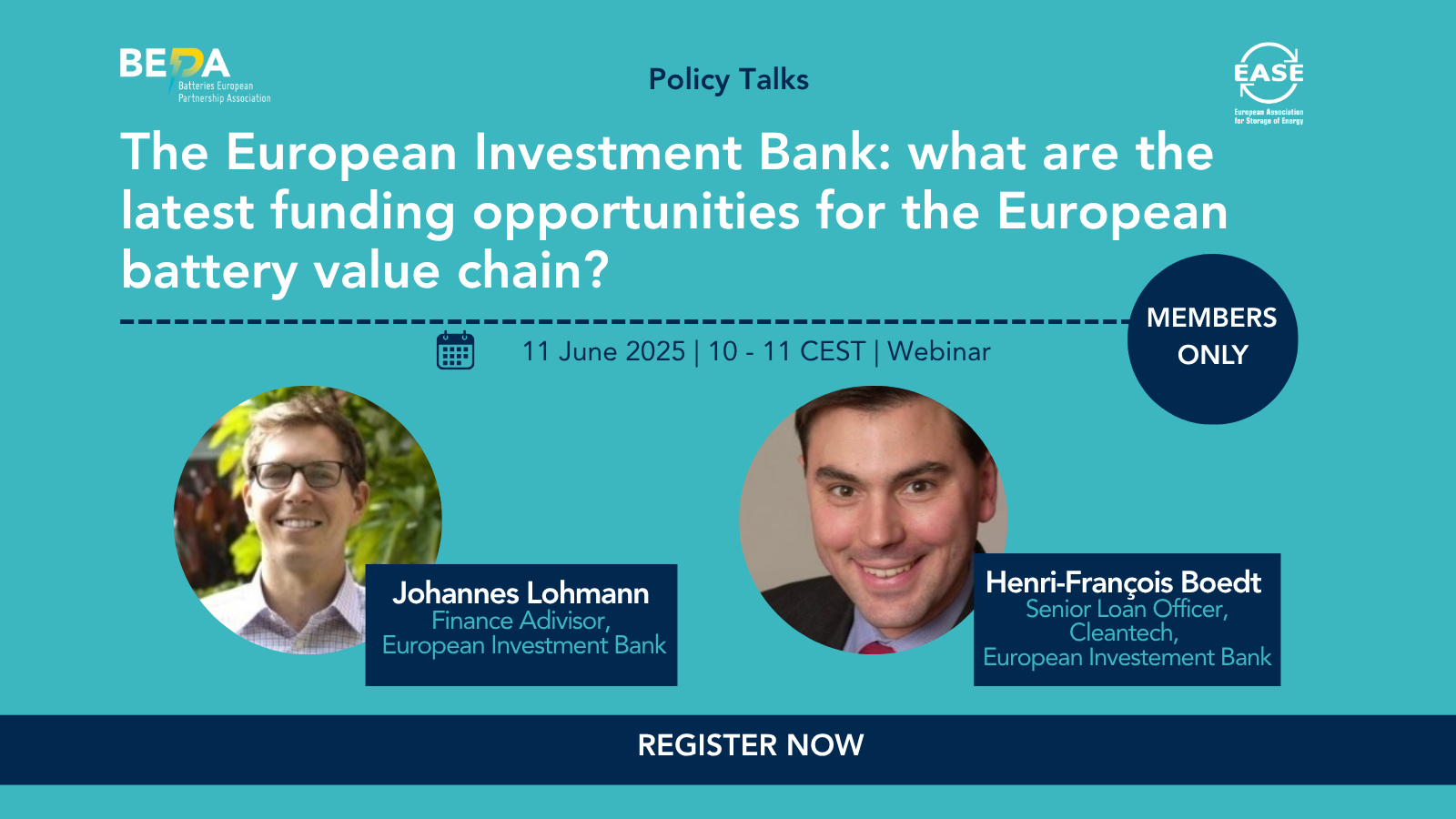
MEMBERS ONLY WEBINAR
Join this exclusive webinar to get an inside look at the funding and support opportunities that the European Investment Bank (EIB) offers for companies and projects working in the battery and energy storage sectors. EIB Finance Advisor Johannes Lohmann and Venture Debt – Cleantech, Henri-François Boedt will provide you with a description of their different programmes relevant to the battery and storage sector.
The European Investment Bank (EIB), the EU’s lending arm, supports sustainable investments aligned with EU priorities, particularly in innovation, climate action, and infrastructure. It plays a key role in scaling up start-ups and SMEs through diverse financial tools. In December 2024, the EIB and European Commission launched a partnership to strengthen the EU battery value chain by improving access to finance for battery development, manufacturing, and scale-up, building on initiatives like InvestEU and the Innovation Fund.
This is a members-only event, we will reject applications from non members.
Register HERE


